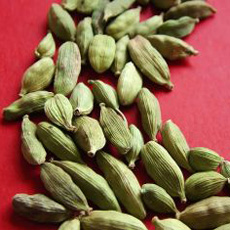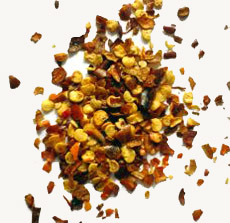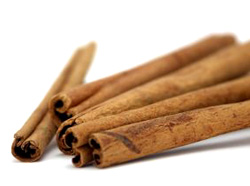
 Photo of cardamom by Kristian Birchall
Photo of cardamom by Kristian Birchall | SXC.
January 2007
Last updated May 2010
|
 |
Checking Herbs & Spices
Keep Them Fresh With This Checklist
Introduction
Once a year, it’s a good idea to “clean house” in your spice cabinet.
Spices and herbs are aromatic natural products. Spices are the dried seeds, buds, fruit or flower parts, bark, or roots of plants, usually of tropical origin. Herbs are the leaves and sometimes the flowers of plants, usually grown in a climate similar to the Mediterranean. After they are harvested they do not spoil, but they do lose their strength. Old seasonings will not flavor foods the way they are intended to. These tips from the McCormick Kitchens staff will help make sure that your spices and herbs still have the punch you expect. Also see Shelf Life Of Foods.
Shelf Life
Here’s what you can expect from your ingredients:
| Ingredient |
Shelf Life |
| Herbs |
1 to 3 Years |
| Extracts |
4 Years, except pure vanilla, which lasts indefinitely |
| Ground Spices |
2 to 3 Years |
| Whole Spices |
3 to 4 Years |
| Seasoning Blends |
1 to 2 Years |
Tips
The Flavor Experts at McCormick Recommend the Following Tips:
1. Check The Date. The expiration date on the container is the first indication of when the spice or herb is ready to toss. If there’s no date, it could be that the bottle pre-dates the expiration-dating system...and is really ready to go.
2. Check The Bottles. There are three ways to determine whether spices and herbs are fresh: appearance, smell, and taste. Faded color is the first giveaway. Scent is the second: Potent spices and herbs have an intense aroma. Rub or crush the spice or herb in your hand. If the aroma is weak, taste it: If the flavor is not apparent, it’s time to replace the spice.
If you need to use it immediately, sometimes faded spices can be freshened by lightly toasting in a warm pan. |
|

Photo of crushed red pepper by Meghan
Anderson-Colangelo | SXC. |
3. Store Away From Heat, Light and Moisture. Store herbs and spices in tightly- capped containers, and keep them away from heat, moisture, and direct sunlight. This means storing them away from the stove, dishwasher, sink or near a window.
4. Don’t Expose To Air & Moisture. Don’t sprinkle spices directly into a steaming pot or pan. Steam introduced into a bottle will hasten the loss of flavor and aroma and will also result in caking. Use a dry measuring spoon and measure seasonings in a small bowl, then add them to the pot or pan. Replace bottle lids tightly immediately after use. Make sure the measuring spoon is completely dry when you dip it into the spice bottle: The added moisture may cause caking or flavor loss.
5. Don’t Freeze. Freezing herbs and spices does not maintain freshness. In fact, the bottles may develop condensation, which can accelerate the loss of flavor and aroma.
6. But Refrigerate Capsicums. Members of the red pepper family (capsicums), such as chili powder and paprika, should be refrigerated to help retain color and guard against infestation. This is important especially during the summer months and in particularly hot climates.
For more information, visit McCormick.com.
|
|

Don’t freeze spices.Photo of cinnamon sticks by Spencer Ritenour. |

|




